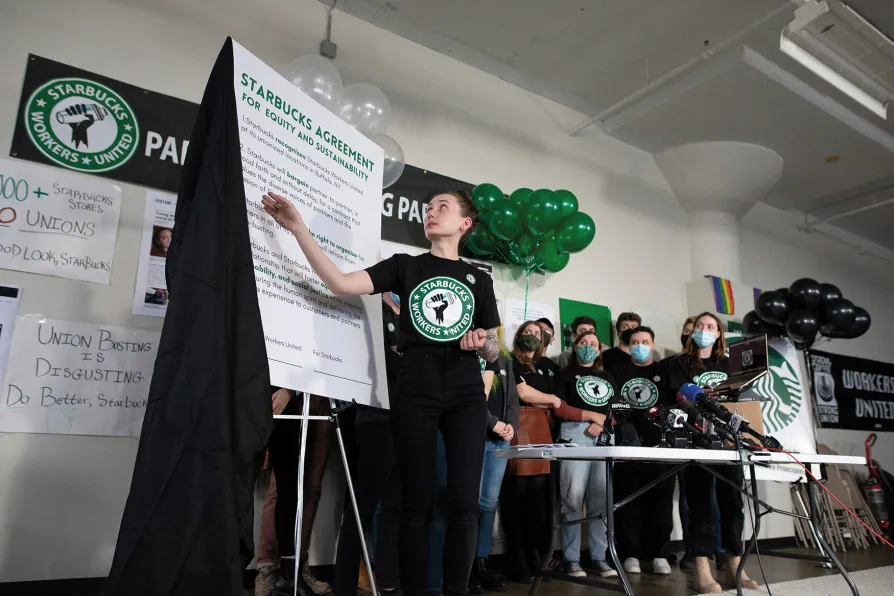LUKE FLETCHER outlines Plaid Cymru bold plans for wide-ranging policy consultations with trade unions in Wales
Organised workers at the notoriously anti-union global giant are scoring victory after victory, and now international bodies are pitching in to finally force this figurehead of corporate capitalism to give in to unionisation, writes EMILIO AVELAR


MASS organisations representing some 85 million workers around the world announced in a public letter late last week their commitment to support unionised Starbucks baristas and uphold picket lines in the event of a strike against the coffee behemoth.
They join a swelling international network of allies and sympathisers of the high-stakes contract battle that turned four years old last month.
National and international labour umbrella organisations like the AFL-CIO signed on to the letter, with federation president Liz Schuler proclaiming categorically that “the labour movement stands with Starbucks baristas.”
The 12 million-strong International Union of Food, Agricultural, Hotel, Restaurant, Catering, Tobacco and Allied Workers Associations (IUF), based in Geneva, adds a global base of support to the letter as a signatory.
Individual US unions like the APWU, AFT, NEA, UFCW, and BCTGM also pledged their support, as well as labour support organisations like Jobs with Justice, Students for International Labor Solidarity, and the Labour Heritage Foundation.
Beyond the traditional labour outfits, civic, climate and political groups like the Working Families Party, the Democratic Socialists of America, MoveOn, Public Citizen, Sunrise Movement, and Greenpeace USA have also pledged their members’ support for the campaign, rounding out a broad progressive coalition capable of mobilising millions.
Concurrently, the World Federation of Trade Unions (WFTU), representing over 110 million workers in 136 countries, issued a statement voicing support for the growing service worker movement that has organised over 12,000 baristas at 650 locations over the last four years. Starbucks has been convicted of hundreds of labour law violations throughout the campaign.
“Their struggle is not just for themselves, but for all workers fighting against the unacceptable anti-union tactics,” proclaimed the WFTU, headquartered in Athens, Greece. In March, the federation’s Young Workers Committee condemned Starbucks and the “state terror” faced by baristas arrested during civil disobedience sit-in actions conducted at unionised stores this spring.
Not just consumer but also shareholder targets are facing pressure from global labour allies. In early September, the IUF issued complaints in Switzerland and Britain against UBS Asset Management and Northern Trust Global Investments, two of the largest European institutional investors in Starbucks.
The IUF complaints claim these investors’ holdings in Starbucks are violating human and labour rights standards required by the Organisation for Economic Co-operation and Development’s responsible business guidelines for multinational corporations.
These new complaints join a series of international pressure actions, including a case brought by the union to the International Labour Organisation’s Committee on Freedom of Association in 2023, alleging that the US government failed to fulfil its treaty obligations to protect workers’ organising rights during the Starbucks campaign.
Starbucks has already felt the painful consequences of rousing an international customer base to action in solidarity with baristas, with global boycott actions tanking sales after the company dared to sue Workers United following worker speech in support of the Palestinian cause.
In a recent op-ed, Workers United president Lynne Fox underlined that Starbucks is “on the ropes,” with mounting scrutiny of CEO Brian Niccol’s jaw-dropping salary, private jet, costly Vegas retreat and new executive stock grants in light of declining sales and flourishing competitors.
Meanwhile, barista militants, fresh off of their 650th election victory, sharpen a strike threat that implies the prospect of another global sales crisis for the corporation.
With hundreds of millions now represented in the union’s domestic and international allies network, Starbucks faces a stark choice: come to terms with union baristas or face global consequences for further anti-worker obstinacy.
This article appeared on Peoplesworld.org.

Gaza’s collective sumud has proven more powerful than one of the world’s best-equipped militaries, but the change in international attitudes isn’t happening fast enough to save a starving population from Western-backed genocide, argues RAMZY BAROUD

This strike is about pay and conditions, says CAMERON HARRISON – but it also shows workers have the power to disrupt the mightiest war machine on Earth












